
Matthew Brady was an English-born convict who became a bushranger in Van Diemen's Land. He was sometimes known as "Gentleman Brady" due to his good treatment and fine manners when robbing his victims.
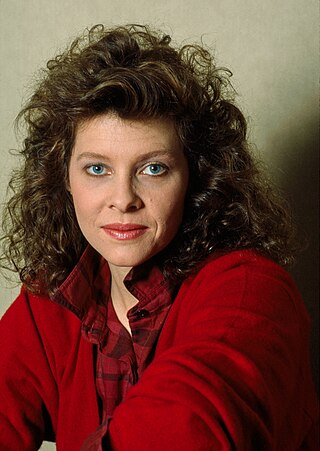
Kathleen Sue Spielberg, known professionally as Kate Capshaw, is a retired American actress and painter. She is best known for her portrayal of Willie Scott, an American nightclub singer and performer in Indiana Jones and the Temple of Doom (1984), directed by her eventual husband Steven Spielberg. Since then, she starred in Dreamscape (1984), Power (1986), SpaceCamp (1986), Black Rain (1989), Love Affair (1994), Just Cause (1995), and The Love Letter (1999). Her portraiture work has been shown in the Smithsonian National Portrait Gallery.

Wyatt Earp is a 1994 American epic biographical Western drama film directed and produced by Lawrence Kasdan, and co-written by Kasdan and Dan Gordon. The film covers the lawman of the same name's life, from an Iowa farmboy, to a feared marshal, to the feud in Tombstone, Arizona that led to the O.K. Corral gunfight. Starring Kevin Costner in the title role, it features an ensemble supporting cast that includes Gene Hackman, Mark Harmon, Michael Madsen, Bill Pullman, Dennis Quaid, Isabella Rossellini, Tom Sizemore, JoBeth Williams, Mare Winningham and Jim Caviezel in one of his earliest roles.

Bandolero! is a 1968 American Western film directed by Andrew V. McLaglen and starring James Stewart, Dean Martin, Raquel Welch and George Kennedy. The story centers on two brothers on the run from a posse, led by a local sheriff who wants to arrest the runaways and free a hostage that they took along the way. They head into the wrong territory, which is controlled by "Bandoleros".

The Magnificent Seven Ride! is a 1972 Western film and is the third and last sequel of the 1960 western, The Magnificent Seven. It stars Lee Van Cleef as Chris Adams, succeeding Yul Brynner and George Kennedy in the role. It was directed by George McCowan.
Kenny Morrison is an American actor, who began his career as a child actor.

In Old California is a 1942 American Western film directed by William C. McGann starring John Wayne, Binnie Barnes and Albert Dekker. Wayne plays Tom Craig, a Boston pharmacist who relocates to Sacramento during the Gold Rush.

"Predators and Prey" is the fifth story arc that spreads from the twenty-first to the twenty-fifth issue of the Buffy the Vampire Slayer Season Eight series of comic books, a continuation of the television series of the same name. The arc is written by Jane Espenson, Steven S. DeKnight, Drew Z. Greenberg, Jim Krueger, Doug Petrie.

Dude Cowboy is a 1941 American western film. David Howard directed the film and Morton Grant wrote the screenplay. The film stars Tim Holt as Terry McVey, Eddie Kane as Gordon West, Marjorie Reynolds as Barbara Adams, Byron Foulger as Frank Adams, Louise Currie as Gail Sargent, Eddie Dew as French, Helen Holmes as Aunt Althea Carter, Lloyd Ingraham as Pop Stebbins, Eddie Kane as Gordon West, and Tom London as the Silver City Sheriff.

Roughshod is a 1949 black-and-white Western film starring Gloria Grahame and Robert Sterling and directed by Mark Robson.
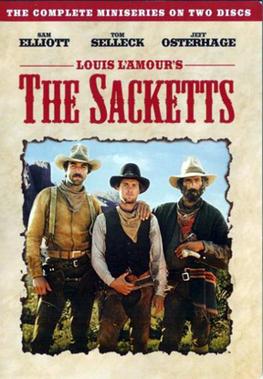
The Sacketts is a 1979 American made-for-television Western film directed by Robert Totten and starring Sam Elliott, Tom Selleck, Jeff Osterhage, and Glenn Ford. Based on the novels The Daybreakers (1960) and Sackett (1961) by Louis L'Amour, the film recounts the story of the Sackett brothers in 1869 who leave their Tennessee home and start a new life together in Santa Fe.
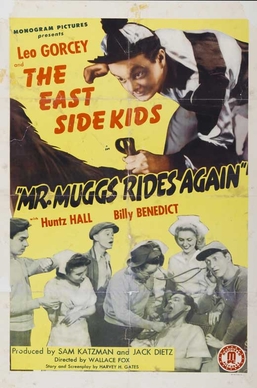
Mr. Muggs Rides Again is a 1945 American comedy film, directed by Wallace Fox and starring The East Side Kids.

Outlaws of Sonora is a 1938 American Western "Three Mesquiteers" B-movie directed by George Sherman. It stars Bob Livingston, Ray Corrigan and Max Terhune. Livingston has a dual role as Mesquiteer Stony Brooke and his outlaw doppelgänger Dude Brannen. Films in the Mesquiteer series are normally considered traditional Westerns but Outlaws of Sonora is an exception; it has a revisionist theme as an early example of the Outlaw/Gunfighter sub-genre.

The Quick Gun is a 1964 American Techniscope Western film directed by Sidney Salkow and starring Audie Murphy. It was the second of four films produced by Grant Whytock and Edward Small's Admiral Pictures in the 1960s.
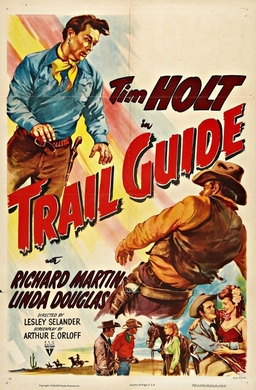
Trail Guide is a 1952 American western film directed by Lesley Selander and starring Tim Holt, Richard Martin and Linda Douglas. Distributed by RKO Pictures, it lost $20,000.

Rio Grande Patrol is a 1950 Western film directed by Lesley Selander and starring Tim Holt and Tom Tyler.
Vigilantes of Dodge City is a 1944 American Western film directed by Howard Bretherton and starring Wild Bill Elliott in the role of Red Ryder and costarring as Little Beaver, actor (Bobby) Robert Blake. It was the fifth of twenty-three Red Ryder feature films that would be produced by Republic Pictures. The picture was shot on the studio’s back lot along with outdoor locations at Iverson Ranch, 1 Iverson Lane, Chatsworth, Los Angeles, CA, USA.
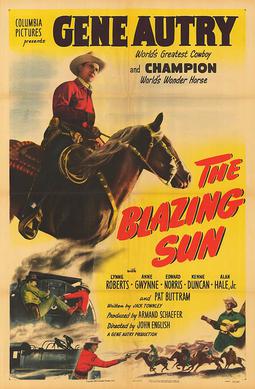
The Blazing Sun is a 1950 American Western film directed by John English and starring Gene Autry, Lynne Roberts, and Anne Gwynne.
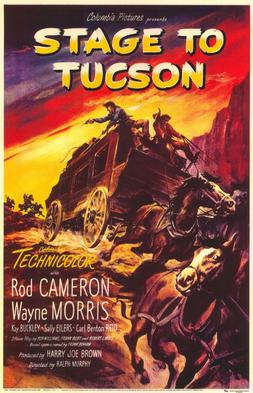
Stage to Tucson is a 1950 American Western film directed by Ralph Murphy and written by Robert Creighton Williams, Frank Burt and Robert Libott. It is based on the 1948 novel Lost Stage Valley by Frank Bonham. The film stars Rod Cameron, Wayne Morris, Kay Buckley, Sally Eilers, Carl Benton Reid and Roy Roberts. The film was released in December 1950, by Columbia Pictures and remade by them in 1956 as The Phantom Stagecoach, reusing extensive footage from the earlier film and changing it from Technicolor to black and white.

Covered Wagon Trails is a 1940 American Western film directed by Raymond K. Johnson, starring Jack Randall, Sally Cairns and Lafe McKee.


















